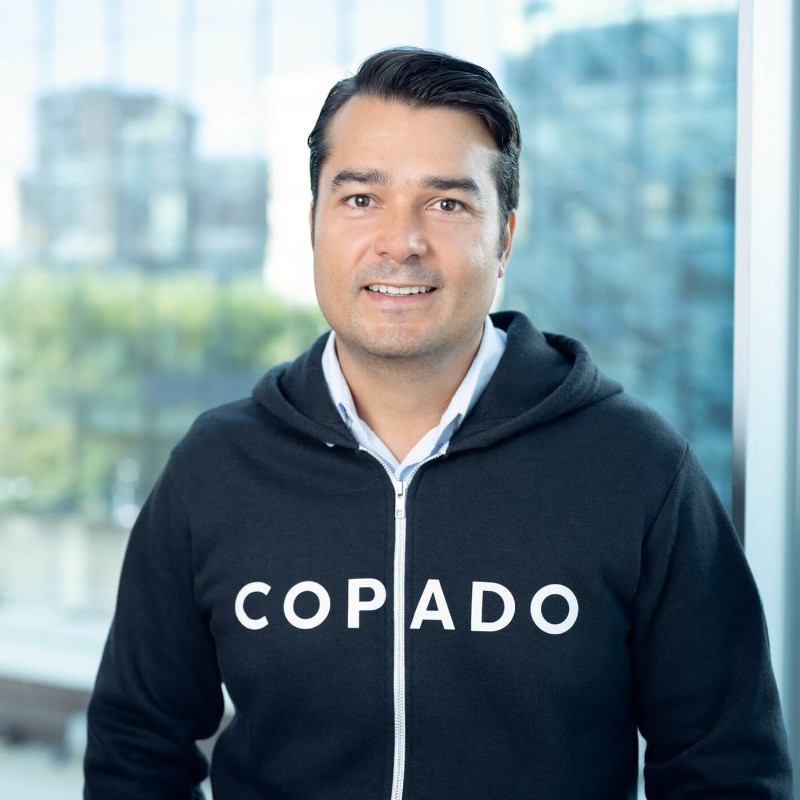On the lighter side of things, we ask Federico Larsen, CIO, Copado, what makes him tick.

What would you describe as your most memorable achievement?
Even though the company is evolving at a rapid pace, when I consider how we started Copado – with no capital, no connections and a real ‘bootstrap’ approach – and then how it is now, it hits home that we had all achieved something special. Especially reaching market leadership in the face of competition from Silicon Valley and London.
What first made you think of a career in technology?
I have always been very optimistic about technology. I see it as the biggest avenue for creativity in business these days and that is perhaps what drew me to this field. A career as a doctor, lawyer, or accountant never really appealed to me. But when I saw how engineering gave you free rein to build and break, I realised it would be a natural home for me. When software became the newest variation on that, removing physical limitations, I quickly moved into this field. The same principles of exploration and creativity remain with me today.
What style of management philosophy do you employ with your current position?
Alongside the other leaders at Copado, I strive to create an environment where people feel they can contribute and are free to experiment and contribute efforts – regardless of if that then leads to failure or success. We are looking to create an environment where learning and growth drive innovation.
As the ‘leader’ in this endeavour, I personally feel that the attributes of humility and approachability are paramount. I work right alongside our teams and I believe strongly that fun and enjoyment – a genuine emotional connection – can make this sustainable.
What do you think has emerged as the technology trend of this year, and why?
I think it’s clearly Generative AI. Its launch and presence has grown so quickly and it is applicable beyond technology, to so many other industries. The reason behind this is perhaps more economic than technological: tougher market conditions demand increased efficiencies and the automation and opportunities that AI offers are incredibly attractive in this regard.
If you think back a couple of years, the markets were all about growth, with cheap capital and money. Compared to the current conditions, everyone is looking into efficiency, EBITDA and margins – hence the huge interest in Gen AI and the potential for disruption to processes.
What do you currently identify as the major areas of investment in your industry?
The main investment driver is customer retention and satisfaction – in a contracting economy or a tougher climate, you see this every time. Budgets for large scale innovation have reduced, and despite the fact that everyone is looking into Gen AI, such innovation is a much smaller percentage of investment than it was.
How do you deal with stress and unwind outside of the office?
As a result of COVID-19, like so many businesses, we no longer have an office. The good news is that this means unwinding is available anywhere. However, it is also important to give some sense of structure to make sure we can then relax away from ‘work’ – and to foster collaboration across teams, so we are investing a lot in group meetings, face to face for the year ahead.
If you could go back and change one career decision, what would it be?
I have been very lucky so far and to be honest, I wouldn’t change much as I don’t want to risk what has been achieved. However, I would have triple checked a few high-profile hires – sometimes previous success does not guarantee they will deliver in industries as new and disruptive as DevOps.
What are the region-specific challenges when implementing new technologies in Europe?
The main challenge is that Europe is not one market, it is a collection of smaller markets. Across Europe, not all countries are on the same page. The UK is typically an early adopter for example. And for us, in a disruptive category, this means a clear, global path to follow – US, UK, Nordic, then Southern Europe. The challenge is that you end up with a lot of different spaces and need a lot of boots on the ground; it remains the case that you need a strong local presence.
What changes to your job role have you seen in the last year and how do you see these developing in the next 12 months?
Last year was all about taking the lead with the innovations of what AI can deliver for us – 2024 will be the continuation of that to use AI to create solutions for users. Broadly put, it is a case of solving the problems better – being faster, leaner and with a better UX.
What advice would you offer somebody aspiring to obtain C-level position in your industry?
The key here is balance. For anyone with a technical background, they need to have a good understanding of the entire business. You must be able to meet and converse with the CFO/CEO but still know the technicality of how the problem will be solved. Too much technicality and you lose the buy in and understanding at the top, however, too much focus on the business and you lose the support of the team below.




